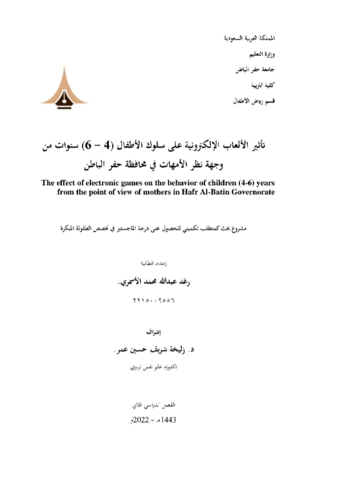وثيقة
فاعلية برنامج قائم على المسرح التفاعلي في تنمية بعض الآداب السلوكية في مرحلة الطفولة المبكرة
العنوان البديل
The effectiveness of a program based on interactive arena in developing some behavioral etiquette in early childhood
المساهم
أحمد، نجلاء محمد علي, مشرف الرسالة العلمية
تصنيف ديوي
155.418
الوصف
استهدفت الدراسة الكشف عن فاعلية برنامج قائم على المسرح التفاعلي في تنمية بعض الآداب السلوكية في مرحلة الطفولة المبكرة، وقد اتبعت الدراسة المنهج شبه التجريبي ذا المجموعتين : التجريبية والضابطة، وتكونت عينة الدراسة من (60) طفلا من أطفال مرحلة الطفولة المبكرة، وقسموا بالتساوي إلى مجموعتين : تجريبية وضابطة، واستخدمت الباحثة في هذه الدراسة مقياس الآداب السلوكية المصور، والبرنامج القائم على المسرح التفاعلي في تنمية الآداب السلوكية.
وأظهرت النتائج الإحصائية وجود فروق ذات دلالة إحصائية بين متوسطي درجات أطفال المجموعتين -التجريبية والضابطة- في القياس البعدي لبعض الآداب السلوكية، ومجموعها الكلي لصالح أطفال المجموعة التجريبية، ووجود فروق دالة إحصائيا بين متوسطي درجات أطفال المجموعة التجريبية في القياسين -البعدي والتتبعي- لبعض الآداب السلوكية ومجموعها الكلي.
وبناء على ذلك فقد أوصت الدراسة بتوصيات، أهمها :
-ضرورة تفعيل المسرح التفاعلي في العملية التعليمية، وخاصة مرحلة الطفولة المبكرة ؛ لما لها من أثر إيجابي (وجداني ومعرفي)، يؤدي إلى تحسين أداء الأطفال بصفة عامة.
-أيضا إعادة النظر في قيمة المسرح وكونها ليست لمجرد الترفيه والتسلية، وإعطاؤها الأهمية التي تستحقها كعنصر هام في تربية وتهذيب الطفل.
-أيضا تجنب استخدام أساليب التدريس التقليدية والروتين في مرحلة الطفولة المبكرة.
-وأيضا تشجيع المعلمات على استخدام الطرق والاستراتيجيات التي تنمي الآداب السلوكية للطفل.
The research aimed to show the effectiveness of a program based on interactive arena in developing some behavioral etiquette in early childhood. This study follows the quasi-experimental methodology which has two groups: experimental and controlling. The study sample consisted of 60 children from the early childhood stage, and they were divided equally into two groups: experimental and controlling. In this study, the researcher used the illustrated behavioral etiquette scale, and the interactive arena-based program in developing some behavioral etiquette.
The statistical results showed that there were statistically significant differences between the children's average grades in the two groups, the experimental and the controlling in the dimensional measurement of some behavioral etiquette. Their total is in favor of the children of the experimental group. In addition, there were statistically significant differences between the average grades of the two children of the experimental group in the two measurements the pre-measurement and post-measurement. Moreover, there were not statistically significant differences between the average grades of the children of the experimental groups in the two measurements: dimensional and consecutive for some behavioral etiquette whose total is wholly. Based on that, the study suggested some recommendations, the most important of which are what follows:
- The necessity to activate the interactive arena in the educational process, especially the early childhood stage because of its positive impact (emotional and cognitive) leading to improving the performance of children in general.
- The reconsideration of the value of theater and that it is not just for entertainment and amusement, and giving it the importance it deserves as an important element in raising and educating a child.
- The avoidance of using traditional teaching methods and routines in early childhood.
- the encouragement of female teachers to use the methods and strategies that develop the behavioral etiquette of the child.
وأظهرت النتائج الإحصائية وجود فروق ذات دلالة إحصائية بين متوسطي درجات أطفال المجموعتين -التجريبية والضابطة- في القياس البعدي لبعض الآداب السلوكية، ومجموعها الكلي لصالح أطفال المجموعة التجريبية، ووجود فروق دالة إحصائيا بين متوسطي درجات أطفال المجموعة التجريبية في القياسين -البعدي والتتبعي- لبعض الآداب السلوكية ومجموعها الكلي.
وبناء على ذلك فقد أوصت الدراسة بتوصيات، أهمها :
-ضرورة تفعيل المسرح التفاعلي في العملية التعليمية، وخاصة مرحلة الطفولة المبكرة ؛ لما لها من أثر إيجابي (وجداني ومعرفي)، يؤدي إلى تحسين أداء الأطفال بصفة عامة.
-أيضا إعادة النظر في قيمة المسرح وكونها ليست لمجرد الترفيه والتسلية، وإعطاؤها الأهمية التي تستحقها كعنصر هام في تربية وتهذيب الطفل.
-أيضا تجنب استخدام أساليب التدريس التقليدية والروتين في مرحلة الطفولة المبكرة.
-وأيضا تشجيع المعلمات على استخدام الطرق والاستراتيجيات التي تنمي الآداب السلوكية للطفل.
The research aimed to show the effectiveness of a program based on interactive arena in developing some behavioral etiquette in early childhood. This study follows the quasi-experimental methodology which has two groups: experimental and controlling. The study sample consisted of 60 children from the early childhood stage, and they were divided equally into two groups: experimental and controlling. In this study, the researcher used the illustrated behavioral etiquette scale, and the interactive arena-based program in developing some behavioral etiquette.
The statistical results showed that there were statistically significant differences between the children's average grades in the two groups, the experimental and the controlling in the dimensional measurement of some behavioral etiquette. Their total is in favor of the children of the experimental group. In addition, there were statistically significant differences between the average grades of the two children of the experimental group in the two measurements the pre-measurement and post-measurement. Moreover, there were not statistically significant differences between the average grades of the children of the experimental groups in the two measurements: dimensional and consecutive for some behavioral etiquette whose total is wholly. Based on that, the study suggested some recommendations, the most important of which are what follows:
- The necessity to activate the interactive arena in the educational process, especially the early childhood stage because of its positive impact (emotional and cognitive) leading to improving the performance of children in general.
- The reconsideration of the value of theater and that it is not just for entertainment and amusement, and giving it the importance it deserves as an important element in raising and educating a child.
- The avoidance of using traditional teaching methods and routines in early childhood.
- the encouragement of female teachers to use the methods and strategies that develop the behavioral etiquette of the child.
تاريخ النشر
2022
نوع الرسالة الجامعية
ماجستير
الجهة المانحة
جامعة حفر الباطن، كلية التربية، قسم الطفولة المبكرة
مدى
أ-ع، 196 ورقة
اللغة
العربية
ملاحظة
يشتمل على ملاحق
المجموعة
مواد أخرى لنفس الموضوع





